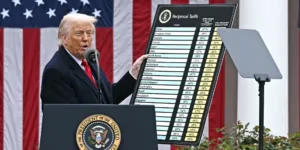Chancellor Rachel Reeves has unveiled her long-anticipated budget, setting the direction for taxes, benefits, energy bills, and business investment over the coming years. The announcement follows an unusual moment earlier in the day when a report by the Office for Budget Responsibility (OBR), which analyses government policy decisions, was mistakenly published early.
From new levies on electric vehicles to the removal of the two-child benefit cap, the budget introduces a mix of tax rises, welfare reforms, and targeted investment, all aimed at reshaping the UK’s economic outlook.
Frozen tax thresholds to raise £8bn
Income tax thresholds will remain frozen for an additional three years. This means workers who receive pay rises may be pushed into higher tax brackets over time, increasing government revenue by an estimated £8bn.
Gambling taxes to rise by more than £1bn
The gambling industry faces significant tax hikes. Remote gaming duty will jump from 21% to 40%, while online betting tax will increase from 15% to 25%. At the same time, the bingo tax will be abolished from April. These measures are expected to raise more than £1bn.
Mileage tax introduced on electric and hybrid vehicles
Electric car drivers will now pay 3p per mile, while hybrid vehicle drivers will be charged 1.5p per mile. According to the OBR, this new mileage charge is expected to generate £1.4bn.
Capital gains relief cut for employee ownership trusts
Capital gains tax relief on business sales to employee ownership trusts will be reduced from 100% to 50%, raising an estimated £900m.
Other tax increases on income and investments
Taxes on dividends, property income and savings income will rise by two percentage points, raising an additional £2.1bn.
Two-child benefit cap to be scrapped
The government confirmed it will scrap the two-child benefit cap from April 2026. The cap currently limits benefit payments for third or subsequent children born after 6 April 2017. By removing it, the government hopes around 450,000 children will be lifted out of poverty. The OBR estimates this will cost £2.3bn.
National Insurance on higher pension salary sacrifice
From April 2029, salary-sacrificed pension contributions above £2,000 per year will be subject to National Insurance. This move is expected to raise £4.7bn.
State pension increases confirmed
The basic state pension will increase by £440 per year, while the new state pension will rise by £575 per year.
Cash ISA limit reduced for under-65s
Savers will only be able to place up to £12,000 per year into cash ISAs tax-free, down from £20,000, to encourage investment into stocks and shares ISAs. People aged 65 and over will retain the full £20,000 allowance.
Fuel duty frozen again
Fuel duty will remain frozen at 52.95p per litre until next September. This decision will cost the government £2.4bn next year and £900m annually afterwards.
New mansion tax on high-value homes
A new mansion tax will apply to properties worth more than £2m. Homeowners will pay £2,500 on properties valued between £2m and £2.5m, rising to £7,500 for homes valued at £5m. The OBR says this will raise £400m.
Energy bills to fall by £150 a year
Average household energy bills will be reduced by £150 from April through the removal of levies. The Energy Company Obligation (ECO) scheme, which tackles fuel poverty and carbon emissions, will be scrapped.
Luxury cars removed from Motability scheme
Luxury vehicles will no longer be covered under the Motability scheme, which supports people with disabilities through PIP.
Student loan repayment threshold frozen
The threshold at which graduates begin repaying student loans will be maintained for three years.
New funding for young people and apprenticeships
A new Youth Guarantee programme will provide £820m to support access to college, apprenticeships or personalised job support. After 18 months, 18- to 21-year-olds will be offered paid work rather than benefits. Training for apprentices under the age of 25 will be free for small companies.
Ride-hailing apps to be taxed
Journeys made through services such as Uber and Bolt will be taxed under a new levy being described as a “taxi tax”.
Rail fares frozen for the first time in 30 years
For the first time in three decades, rail fares will be frozen. Season tickets, peak and off-peak return tickets between major cities will not increase.
Business rates adjusted
Business rates will be reduced for 750,000 retail, hospitality and leisure premises. The cost of this relief will be funded through higher rates on properties valued over £500,000, including warehouses used by large online retailers.
Stamp duty break for new stock market listings
Companies newly listing on the London Stock Exchange will benefit from a stamp duty holiday for three years.
OBR economic outlook
The OBR now predicts GDP growth of 1.4% in 2026, down from a previous forecast of 1.9%. Growth is expected to remain at 1.5% for the rest of the decade. Inflation is also forecast to be higher than previously expected, at 3.5% this year and 2.5% next year.
The chancellor’s fiscal headroom has doubled to £22bn by 2029–30, providing a cushion against future shocks such as another pandemic or energy crisis.
Investment in healthcare, defence and devolved governments
The government will invest £300m in NHS technology and 250 new neighbourhood health centres, with more than 100 due to be delivered by 2030 in places including Birmingham, Truro and Southall.
Spending on defence will reach 2.6% of GDP. Additional funding will also go to devolved administrations, with £317m for Northern Ireland, £505m for Wales and £820m for Scotland.
Meanwhile, £13bn in “flexible” funding will be allocated to seven regional mayors to support skills development, business support and infrastructure investment.






